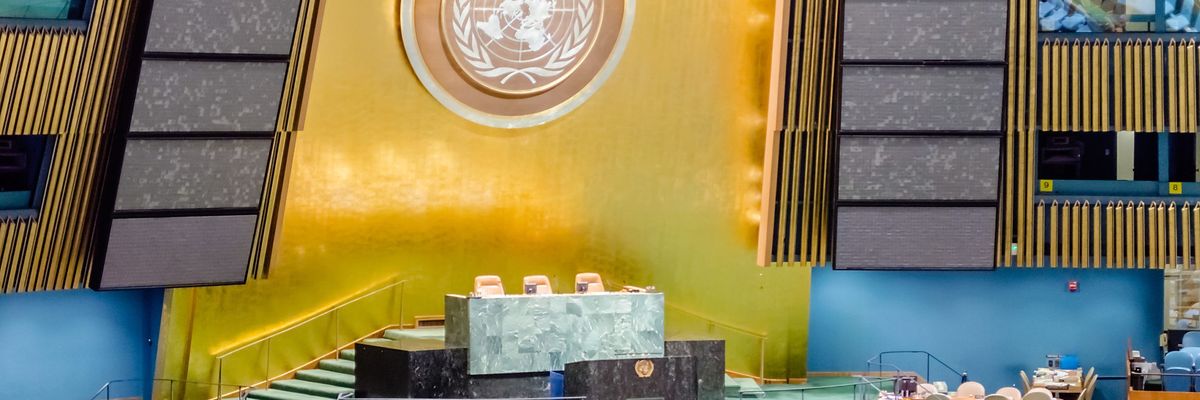The COVID-19 outbreak has already begun to reshape life around the globe. In a diversity of countries, from South Korea to Italy to the People’s Republic of China, governments are scrambling to address and cure a pandemic the likes of which haven’t been seen since the so-called Spanish Flu of 1918-1920.
Here in the United States, President Donald Trump has invoked the Defense Production Act — signed by President Harry S. Truman in September 1950, soon after the outbreak of the Korean War — which allows the government to force U.S. companies to manufacture materials needed to attenuate the outbreak. Meanwhile, Congress looks set to pass a $2 trillion bill that attempts to avoid a corona-inspired depression. These actions suggest that, in the two months since the United States had its first COVID-19 case, we are entering a prolonged period of crisis that has the capacity to reshape contemporary politics.
Throughout modern history, crises have been key to engendering enormous political, economic, and social transformations. Indeed, the major institutions of our modern world were created during and shortly after World War II, a devastating conflict that restructured domestic and geopolitics.
At the level of international relations, these include the United Nations, the World Bank, the International Monetary Fund, and the World Trade Organization (the successor to the General Agreement on Tariffs and Trade). At the domestic level, these include the Central Intelligence Agency, the National Security Council, the Council of Economic Advisers, and the Department of Defense.
And of course, it was the crisis of World War II that encouraged U.S. policymakers to embrace the strategy of primacy that continues to define U.S. foreign affairs. Put simply, the war convinced generations of American elites, and ordinary Americans, that world peace and prosperity depended on the United States asserting and maintaining global hegemony. In fact, the United States’ world posture — our approximately 800 military bases, our enormous defense budget, and our willingness to deploy Special Forces abroad — emerged directly from lessons learned in the 1940s.
The coronavirus, however, threatens to upend the post-World War II order. For the first time since that war, Americans are rethinking their relationship to both their state and the world itself. The fact that our very way of life is on the verge of collapse due to people missing two or more paychecks has suggested to many ordinary and elite Americans alike that the neoliberal capitalist economy might have such significant problems that extraordinary measures — such as, to take one suggestion floated recently, mailing people checks for thousands of dollars — might be in order.
From the perspective of geopolitics, the pandemic has also underlined that the problems of the twenty-first century will be unlike those of the twentieth. Today, the effects of pandemics — and climate change and inequality — cross borders and require forms of international cooperation not seen in the past. Thus, while the United States might have significant issues with rivals like China and Russia, the COVID-19 outbreak makes clear that, in the final analysis, we are all humans who need to rely on one another if we are to overcome transnational challenges.
In the immediate aftermath of World War II — and, in particular, after the advent and employment of atomic weapons — a number of U.S. elites cogitated upon the possibility of establishing an international organization in which nations surrendered elements of their sovereignty. This, these elites avowed, was the only way to ensure that a nuclear World War III never erupted. Though these dreams were quickly dashed due to the Cold War, they must be seized upon today.
In particular, restrainers need to begin thinking seriously about international organization. In the past, groups like the U.N., IMF, and World Bank rightly have been accused of serving as vehicles for American and Western interests. This was dramatically highlighted in 2003, when the United States and its allies decided not to seek U.N. Security Council support for the invasion of Iraq.
This must change. In an era defined by transnational and global challenges, we must begin thinking about ways to transcend the nationalist ideologies that have divided humanity throughout the nineteenth, twentieth, and twenty-first centuries.
The COVID-19 outbreak, while frightening, presents an opportunity to reconsider some of our fundamental assumptions about sovereignty, international relations, and global power itself. In fact, presidential candidate Senator Bernie Sanders (D-Vt.) has already started this process. Throughout his campaign, Sanders has regularly highlighted how U.S. citizens are connected to people around the world. To cite just one of many examples, in July 2019, Sanders told the Council on Foreign Relations that he would not rejoin the Trans-Pacific Partnership (TPP) because, he affirmed, it wouldn’t bring American jobs back and would force U.S. laborers to compete with foreigners “who are working as modern-day slaves.” Sanders, unlike the majority of presidents and presidential candidates, gestured toward a post-nationalist politics that put human beings, not just Americans, at its center.
Seventy-five years ago, Americans emerged from World War II ready to abandon some of their sovereignty in order to create a more just, peaceful, and prosperous world. The rivalry with the Soviet Union, though, prevented this from happening. But the Cold War is now history. In 2020, the major challenges the United States faces are not national, but are rather inter- and trans-national, in character. It is far more likely that Americans will suffer and die from viral outbreaks, climate disruptions, and inequality, than on battlefields in China or Russia. As such, restrainers must begin developing the international organizations — and international ideas — appropriate to confronting and solving the problems Americans, and humanity in general, face today.
















